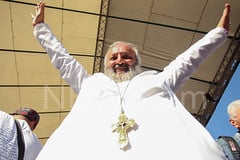
Armenian News-NEWS.am agency together with the Ministry of Foreign Affairs of Armenia continues a series of interviews titled “Talk with Ambassador”. This week our guest is Armenia's Ambassador to Belarus Armen Khachatryan.
How can you describe relations between Armenia and Belarus? Is history remembered?
The Armenian and Belarus nations lived next to each other for centuries. We were parts of one country --- the Soviet Union – for several decades, and this, of course, left a positive influence on Armenia-Belarus relations. During the Great Patriotic War, many Armenians shed blood for liberation of Belarus. There were many Armenians among the defenders of the Brest fortress. Marshal Baghramyan made a considerable contribution to liberation of the Belarus land.
As to modern history, the diplomatic relations between Armenia and Belarus were established in 1993 when an Armenian embassy opened in Minsk, and in 2001 the diplomatic representation opened in Yerevan.
Armenia and Belarus are CIS members. Moreover, they are members of a common military and political bloc – CSTO, a common economic alliance – Eurasian Economic Union. This has a strong impact on bilateral relations. The positions of our countries coincide on almost all international issues, and there are no problems between the states. Frequent mutual visits prove we have friendly relations. As to economic ties, we expect serious progress with the accession to Eurasian Economic Union.
How many Armenians live in Belarus, and how strong is the connection between embassy and the community?
According to official data, around 10,000 Armenians live in Belarus, but informal data suggesst there are 30-35 thousand Armenians. The Armenians are engaged in social, economic and cultural life of the country.
The embassy has always supported organizations of the community. With the help of the embassy, the Armenian community participates in the cooperation programs of Armenia and Diaspora. The embassy regularly organizes and support events with the participation of community structures.
“Hayastan” educational and cultural center that was founded in Minsk in 1989 is the largest Armenian organization in Belarus. There are other four organizations in Belarus regions.
There is a Sunday school in Minsk, ensemble of Armenian songs and dances. As to print media, Miasis newspaper and Aniv magazine are published. There are also websites: www.miasin.by и www.diaspora.by.
What are the trade prospects between the states given Armenia's joining the Eurasian Union?
The accession of Armenia to the Eurasian Economic Union for our country opened up opportunities for the development of economic relations with its member states, including Belarus. Obstacles to the further development of a effective relationship no longer exists. Armenia opened a large market, which has a free movement of people, capital, goods and services. We hope that the turnover of Armenia and Belarus will intensify and will reach a new, higher level. Belarus is the third among CIS states on trade turnover with Armenia.We have a wide range of products that Belarus needs, and vice versa.
.jpg)
You are also Armenia's permanent representative at CIS. How do you assess Armenia's participation in this structure?
Armenia is represented and is actively working in all CIS structures. Armenia signed 101 of 112 documents adopted in CIS structures last year, as compared to 99 signed by Russia and 34 by Azerbaijan.
Over recent years, among the issues most actively discussed within the framework of the CIS are consolidation of efforts for the development of humanitarian cooperation in combating international terrorism, organized crime, illegal migration.
How is the embassy preparing for the Armenian Genocide Centennial?
As the embassies in other states, we attach special attention to the process of international recognition and condemnation if the Armenian Genocide. Several days ago the Embassy in Minsk and Golden Apricot international film festival organized screening of films dedicated to the 100th anniversary of the Armenian Genocide. Among them were Mama, Ararat, Grandma's Tattoos and others.
The embassy and community will hold other events to commemorate victims of the Armenian Genocide.
You previously held the post of parliament's speaker. Where do you better realize you potential as the head of the legislature or the diplomatic service?
Regardless of the office, I was always inclined to public thinking and always worked as fruitful as possible. It is hardly appropriate to give assessment to my work.
On March 2 Armenia marked Diplomat's Day. What difficulties are you and your colleagues faced with?
I want to once again congratulate our diplomats and wish them success in the difficult, responsible and very important work. There are many challenges, but every diplomat should, first of all, understand that it he is a person representing Armenia abroad. As a small country, we need to spare more efforts to be more active than others.
















